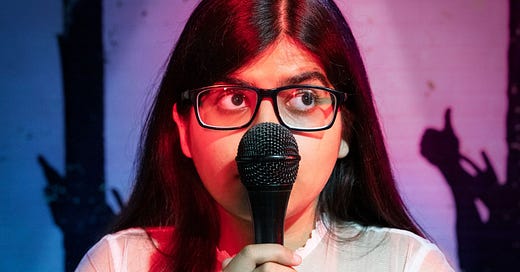Welcome to America, You're Cancelled: Indian Comedian Has the Last Laugh
Surbhi on being brown and problematic, and what she won't say on stage
I first met Surbhi (below she explains why she has no last name) in 2016 when she snuck into a private screening of a film I directed called Can We Take a Joke?
The event took place at the Newseum in Washington, D.C., and the post-screening panel discussion included my wife (who produced the film) and me, as well as an ACLU attorney, G…
Keep reading with a 7-day free trial
Subscribe to Shiny Herd to keep reading this post and get 7 days of free access to the full post archives.





